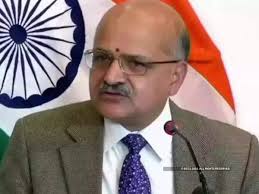
In a significant statement highlighting India’s trade strategy, Niti Aayog CEO B.V.R. Subrahmanyam advocated for India’s inclusion in the Regional Comprehensive Economic Partnership (RCEP) and the Comprehensive and Progressive Agreement for Trans-Pacific Partnership (CPTPP). Speaking at an Assocham event in New Delhi on Thursday, Subrahmanyam emphasized the potential advantages these trade blocs hold for India’s small and medium enterprises (MSMEs), which contribute 40% of the nation’s exports. “India is among the few nations not part of large trade agreements. Joining RCEP and CPTPP would best serve our MSME sector,” Subrahmanyam said. India pulled out of RCEP in 2019 after six years of negotiations, citing concerns over the trade imbalance, especially with China. RCEP currently includes 10 ASEAN countries—Brunei, Cambodia, Indonesia, Malaysia, Myanmar, Singapore, Thailand, the Philippines, Laos, and Vietnam—and their six FTA partners, namely China, Japan, South Korea, Australia, and New Zealand. The CPTPP, a trade pact encompassing Pacific Rim countries, counts among its members Canada, Mexico, Peru, Chile, New Zealand, Australia, Brunei, Singapore, Malaysia, Vietnam, and Japan. The Niti Aayog CEO highlighted India’s underutilization of the “China plus one” strategy, a global trend of diversifying supply chains away from China. He noted that countries like Vietnam, Indonesia, Malaysia, Turkey, and Mexico have successfully capitalized on this trend, benefiting from increased investment and trade. “We have not captured the China plus one opportunity as much as we could have,” he said, adding that India current tariff structure presents barriers to trade competitiveness.
Subrahmanyam pointed out that India’s higher-than-average tariffs create bottlenecks, limiting the country’s access to global value chains. According to him, 70% of the world’s trade operates through these global value chains, and unless India lowers tariffs, it risks missing out on significant trade benefits. This aligns with recent recommendations from the World Bank, which suggested in its India Development Update that India should reconsider joining RCEP to boost trade, investment, and GDP growth. India’s cautious approach to trade agreements, particularly with China, was underscored by Finance Minister Nirmala Sitharaman, who has previously highlighted the “sensitivities” involved in regional trade relations. Barring China, India either holds or is negotiating FTAs with nearly all other RCEP member countries. The Economic Cooperation and Trade Agreement (ECTA) with Australia, for instance, is already operational, while a Comprehensive Economic Cooperation Agreement (CECA) is under discussion. The call for India’s inclusion in RCEP and CPTPP also follows a trend observed among ASEAN and other member states. ASEAN’s trade deficit with China surged from $81.7 billion in 2020 to $135.6 billion in 2023, with key member nations seeing increased deficits. Japan’s trade imbalance with China has more than doubled since 2020, reaching $41.3 billion by 2023. As a result, concerns remain about RCEP’s perceived skew toward China’s economic benefit, which originally led India to withdraw from the negotiations.
Subrahmanyam acknowledged India’s impressive economic trajectory, noting its recent 8.2% growth rate and projected rise as the world’s third-largest economy by 2027. He cited MSMEs as crucial to India’s export profile, contending that they stand to gain significantly from broader market access through major trade pacts. “We’re a rising economic power, but we need to be fully integrated into global trade networks to maintain this momentum,” he concluded, pointing out the potential impact of increased MSME exports on India’s global economic footprint. With a continued push for foreign investment and trade liberalization, India’s alignment with major trade partnerships remains a key topic of discussion, as it navigates a rapidly shifting global trade landscape and growing expectations for strategic economic alliances.
Author Profile
- India Writes Network (www.indiawrites.org) is an emerging think tank and a media-publishing company focused on international affairs & the India Story. Centre for Global India Insights is the research arm of India Writes Network. To subscribe to India and the World, write to editor@indiawrites.org. A venture of TGII Media Private Limited, a leading media, publishing and consultancy company, IWN has carved a niche for balanced and exhaustive reporting and analysis of international affairs. Eminent personalities, politicians, diplomats, authors, strategy gurus and news-makers have contributed to India Writes Network, as also “India and the World,” a magazine focused on global affairs.
Latest entries
 DiplomacyJanuary 5, 2026India walks diplomatic tightrope over US operation in Venezuela
DiplomacyJanuary 5, 2026India walks diplomatic tightrope over US operation in Venezuela India and the WorldNovember 26, 2025G20@20: Africa’s Moment – The Once and Future World Order
India and the WorldNovember 26, 2025G20@20: Africa’s Moment – The Once and Future World Order DiplomacyOctober 4, 2025UNGA Resolution 2758 Must Not Be Distorted, One-China Principle Brooks No Challenge
DiplomacyOctober 4, 2025UNGA Resolution 2758 Must Not Be Distorted, One-China Principle Brooks No Challenge India and the WorldJuly 26, 2025MPs, diplomats laud Operation Sindoor, call for national unity to combat Pakistan-sponsored terror
India and the WorldJuly 26, 2025MPs, diplomats laud Operation Sindoor, call for national unity to combat Pakistan-sponsored terror







